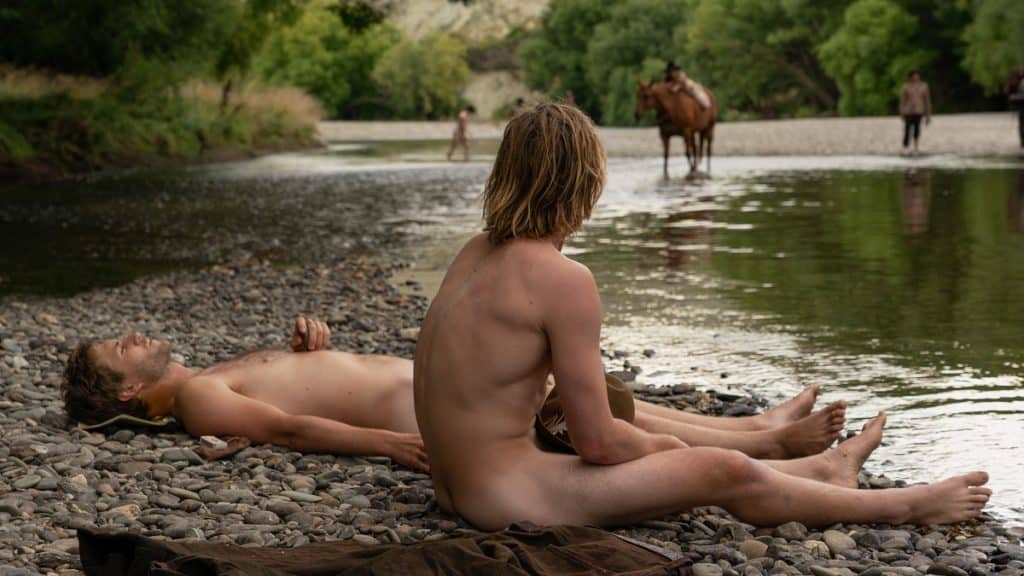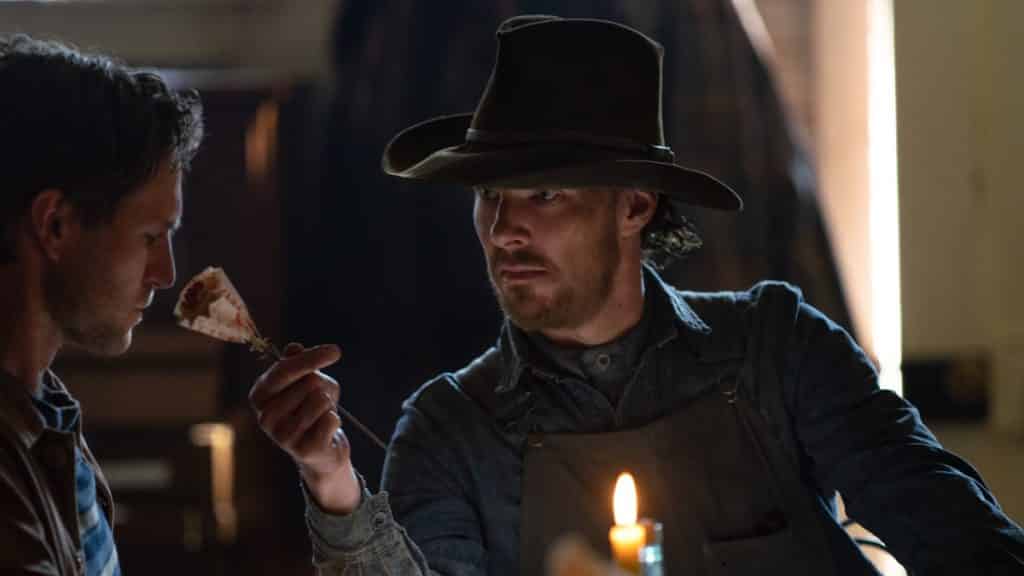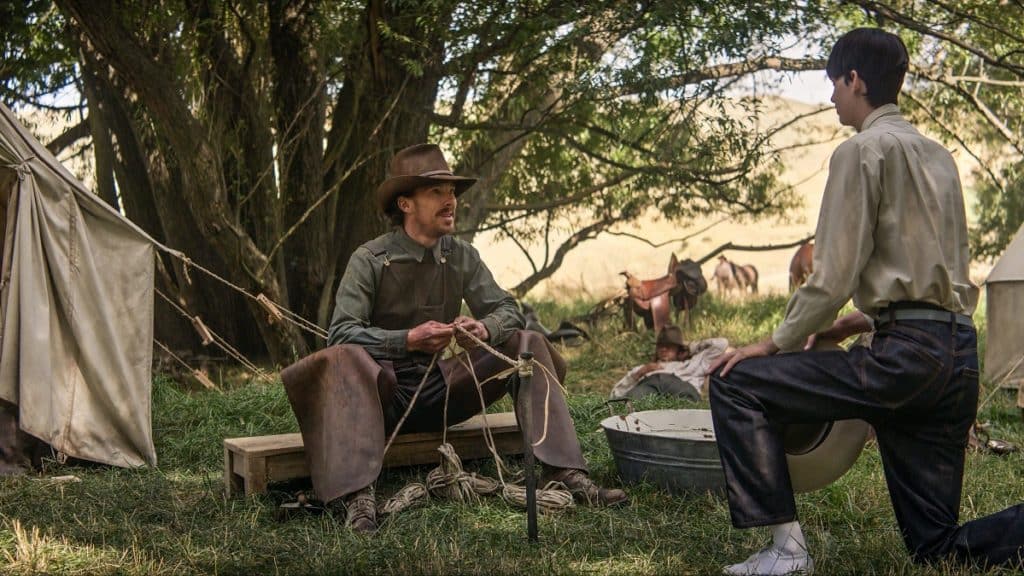Jane Campion’s latest explores how the rich and powerful assume–and shed–the trappings of others for their fulfillment.
Contains spoilers about The Power of the Dog (read our spoiler-free review here)
Jane Campion’s latest, The Power of The Dog (based on the Thomas Savage novel of the same name), centres around the complicated figure of Phil Burbank (played by Benedict Cumberbatch). A wealthy man who studied classics at Yale, he moves with his brother to Montana to run a ranch given to them by their parents. Throughout the film, Cumberbatch displays a range of extremes to form a character ripped straight out of a classical tragedy – whose fatal flaw is his dedication to a version of masculinity that destroys himself and the people around him. Through this hamartia, the critique she forms seeks to challenge a form of masculinity constructed through wealth and whiteness.
Phil is a man who stinks. You see several shots of Cumberbatch curled up on fresh sheets with grimy clothes on. The only place he’ll wash himself is in the lake by his hideaway. At one point, he even proudly proclaims how much he likes to stink.
By contrast, George (Jesse Plemons) uses the nice-looking bath in the house. It’s one Phil has never used, the film notes. George also takes off his (considerably cleaner) clothes before he gets in bed. The stinking is crucial to how Phil understands his masculinity. Kirsty Cameron’s costume design provides him with an aesthetic ruggedness and visually approximates him to the men who work beneath him.

The difference here is that Phil always has the option to be clean. The bath is always there. He doesn’t even have to leave the house to access it, and there is no suggestion that using the bath would be burdensome. Unfortunately, that is not the same for the workers. So instead of an inevitable reality of hard labour and limited access to appliances, the dirt caked on Cumberbatch functions as a costume – a wealthy man’s idea of the looks and smells of working-class masculinity.
This classed performance of Phil’s masculinity continues through to his engagement with other people. At face value, he is a man of the people. He drinks and jokes with the workers, often at the expense of the effeminate Peter (Kodi Smit-McPhee), at one point burning the flowers that the latter had carefully prepared as table decoration. He even takes his workers to a dive bar, getting them all shots and watching as everyone dances with (implied) sex workers. While he is play-acting at being just another of the boys, a power dynamic is subtly asserted.
Of all the people on the ranch, Phil only doesn’t have meaningful power over his brother George. Rose (Kirsten Dunst), the sex workers* and the men he employs, are of lower class status and dependent on his money to live their lives. The ability to be cruel as part of the execution of his vision of working-class masculinity is ironically reliant on the dominance afforded to him by his wealth.
Campion crafts a critique of a specific violent vision of masculinity, constructed through race and class that continues to this day.
The type of masculinity which Campion critiques must also be understood through a racial lens. This element comes through clearly in the ongoing back-and-forth that he has over the hides from the cattle. He gets his staff to turn away the Indigenous people looking to buy them. Not to use them himself, though; he just burns them. There are clear parallels here to the mass-slaughtering of buffalo by American settlers, which had less to do with need and more to do with exercising racial domination and genocide.
One of the more terrifying parts of Cumberbatch’s performance comes when he flies into a rage after finding out that Rose has traded the hides away to the indigenous people – screaming, “They were MINE!”. It is not that he needed the hides for anything essential. He simply cannot bear the idea of these racialised people he sees as below him having ‘his’ hides. To cede anything but complete domination over both nature and the people who reside within it would be an insult to his Manifest Destiny-inflected white masculinity.
At the same time, he deliberately approximates himself to a racialised idea of Wildness with his continued rejections of modernity. He bathes naked in the lake. He works on cattle bare-handed while everyone else uses gloves. He refuses to go to the doctor when he’s hurt. In all of this, he ostensibly rejects the tools of civilization and reaches into a more pure and savage version of being – a concept intensely racialised. In reality, he isn’t rejecting those tools at all because his ability to ‘reject’ relies on the ultimate colonial technology – whiteness. He owns this land and is free to roam on it in a way that the Indigenous people simply cannot – especially during the 1920s.

Campion’s critique doesn’t just apply in the film’s time and place – there is a continuation of Burbankian masculinity through to the modern-day. When white men want to seem tough and manly, they approximate themselves to racialised working-class masculinities. Out comes the basketball shorts, the chains, and the (forced) appropriation of racialised slang. You can see this whenever a musician decides to have an ‘urban’ era to throw away an innocent image (see: Justin Bieber). This continues the fetishised idea of Wildness that Phil evokes, which is perhaps most clearly evoked in something like the Dior Sauvage marketing.
At the same time, these men can and will always keep just enough distance to ensure that they aren’t seen as racialised or poor. You can see this with rappers like Macklemore, whose careers (talent aside) build from how their whiteness and class position them as ‘different’ than the racialised rappers they emulate. Phil demonstrates this by never communicating with the Indigenous people in any meaningful way, getting his staff to turn them away for him.
Ultimately this isn’t a film about the evils of (toxic) masculinity in the abstract. Campion crafts a critique of a specific violent vision of masculinity, constructed through race and class that continues to this day.

This comes full circle when Burbank dies. Y’s camera pulls us in tight as we see Cumberbatch’s corpse in an expensive formal suit. Anonymous white hands shave off his haphazard ‘wild’ facial hair to reveal a smooth, clean, and WASP-ish face. In death, the facsimile is stripped off – he was a rich man playing dress-up.
In this scene, we see that a small and quiet ceremony in the corner of a ragged lot is not what awaits these men who pretend, who falsify class and race to construct their manhoods. Instead, they are buried amongst other suits and ornate caskets for all their wealthy friends and family to remember in ease and comfort.
At the same time, the men they imitate will die Black, die Indigenous, die Latine, die poor. A collector will rob their gravesites will be to further their obsession. He gets to slip off the mask and receive burial as the wealthy white man that he was. That is what it means to be a Phil Burbank kind of man.
The Power of the Dog is now playing on Netflix.